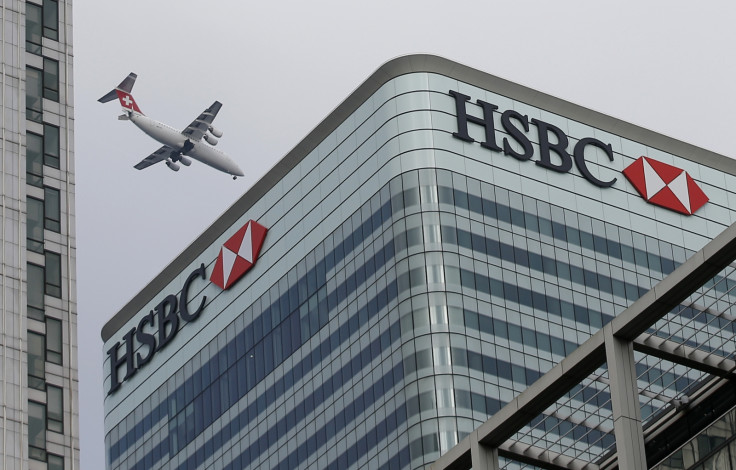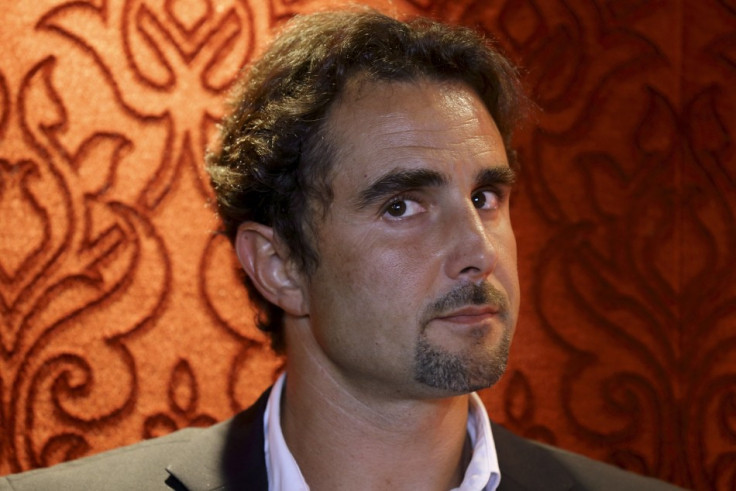HSBC links to Syria mean intelligence services would be first in queue to examine leaked files

Her Majesty's Revenue and Customs (HMRC) this week received another grilling – its second – over an apparent failure to do anything with potentially incriminating tax information leaked from HSBC, first made available to the UK in 2010.
HMRC said there was "good news" - that it was finally to be allowed to share the information with other criminal agencies and could now pursue investigations in earnest. HMRC does not act in isolation, teaming up with the likes of the Serious Fraud Office, the Met police and the Crown Prosecution Service. The revenue said it would be holding meetings in February to plan the next move.
One reason UK tax authorities may have been forced to sit on their hands could be that they were waiting in a queue behind certain powers greater than themselves.
I would be very surprised if that disc didn't go to the intelligence services first, in light of the Levin report, given evidence of large-scale money laundering and money going to Syria
Given that HSBC paid a record $1.9bn (£1.2bn, €1.7bn) fine in 2012 to settle US money-laundering allegations, and has also been alleged to have had links with the regime of Syrian president Bashar al-Assad, it seems likely the leaked information would have a thorough going over by intelligence services before going near a tax authority.
US senator Carl Levin criticised the bank in a report alleging that HSBC's subsidiaries transported billions of dollars of cash in armoured vehicles; cleared suspicious travellers' cheques worth billions; allowed Mexican drug lords to buy planes with money laundered through Cayman Islands accounts.
The Senate report also said other subsidiaries moved money from Iran, Syria and other countries on US sanctions lists, and helped a Saudi bank linked to al-Qaeda to shift money to the US. The rise of Islamic State (Isis) would mean special attention would be required to examine where any laundered cash was going.
Tessa Lorimer, special counsel on behalf of Withers International Wealth Planning and Tax Investigations, told IBTimes UK: "I would be very surprised if that disc didn't go to the intelligence services first, in light of the Levin report, given evidence of large-scale money laundering and money going to Syria. Of course you don't hear about that. There's a lot goes on beneath the surface you don't hear about."
The BBC Panorama investigation based on the leaked HSBC files, swooped on lurid details of millions in various currencies apparently being withdrawn from the bank, suggesting suitcases of cash may be going in and out of Switzerland.

The hardest part about money laundering is getting the money into the financial system in the first place; all the layering and shell companies that follow are the relatively risk-free stage for launderers. If lots of dirty money is entering the financial system in Switzerland, then this would amount to a grave crime.
The Swiss authorities raided the offices of HSBC in Geneva earlier in February citing charges of aggravated money laundering. The system by which criminal charges are brought in Switzerland is split between a federal prosecutor's office, the attorney general Michael Lauber and regional prosecutors at the 26 cantons.
Apparently, Lauber's office told the media it could not use the evidence to pursue prosecution because of the "delicate legal circumstances" but the cantonal prosecutors decided to go ahead and raid the bank, according to a partner at a Swiss law firm who specialises in money laundering cases.
"It's correct to say that the evidence [Hervé Falciani's disc] was stolen so not admissible in Swiss court. Sometimes the different prosecutors can take different approaches. It seems the cantonal prosecutors in Geneva have decided to go in and get the evidence themselves," he said.
Update of money laundering laws
The impression conveyed from Switzerland is one of frustration. It has been amending and updating its money laundering laws for the past 15 years and there's more in the pipeline slated for mid-2015.
The lawyer said he expects the analysis of information seized from the bank to take a few weeks at least. He said in terms of predicate offences to money laundering, the Swiss authorities will be going after high-level crimes such as drug trafficking.
However, Lorimer said: "It's interesting that Swiss police raided HSBC – was this as a result of allegations that have been made, or was it as a request from a third-party country – the UK or the US, or even France?"
It's interesting that Swiss police raided HSBC – was this as a result of allegations that have been made, or was it as a request from a third-party country – the UK or the US, or even France?
Returning to the obstacles facing an HMRC criminal investigation, the revenue has attributed much of its problems conveniently to the French, who set out conditions not to share the information with other authorities.
Apparently, the fact that HMRC has been subject to conditions not to share the information with other law enforcement agencies is not unusual, particularly when a large amount of information is passed from one country to another, as it was here.
Lorimer said: "When information is received from another country, the country 'passing' the information often imposes conditions in order to restrain the use of the information by initially imposing blanket safeguards regarding the use that the information is put to.
"However, there was nothing stopping HMRC from going back to France to see if they would allow the information to be shared with the SFO for example if there were specific causes for concern once the disc had been interrogated. I don't know if HMRC did that and if they did what the response was from France, but I suspect that they didn't."
Role of the CPS
So far, HMRC has passed just three files to the Crime Prosecution Service (CPS), which had led to one prosecution.
A spokeswoman for the CPS told IBTimes UK: "HMRC decides whether or not to investigate and pass a file to the CPS – if they do pass us a file, of course we would consider it in the same way that we would with any other case.
"The CPS considered each case carefully and applied the same test it does to all cases and found that only one of three case files submitted satisfied the evidential test needed to bring charges."
The fact that Switzerland has been humiliated in this case, after asking for the extradition of Hervé Falciani, could be another obstacle. The Swiss have called for the extradition but then had to face the humiliation of the French divvying up the information, meaning suddenly everyone knew what had been going on.
The CPS considered each case carefully and applied the same test it does to all cases and found that only one of three case files submitted satisfied the evidential test needed to bring charges
This will have upset the Swiss, who were probably less likely to play ball with the HMRC until an official tax agreement was set up in 2013.
From a criminal prosecution perspective, the information provided to HMRC from the files was insufficient. It comprised names, known addresses, the type of account and similar information.
"What these files constitute is hearsay evidence – the veracity of this information could not be proved," Lorimer said.
To carry out an investigation requires bank statements; who the account was opened by; when it was closed; how much money went through it; instructions from the manager; Know Your Customer information. This is all held in Switzerland. To get it, you need a letter of request.
Prior to 9/11 nothing ever came out of Switzerland. These days, Switzerland tends to submit this sort of information, if money laundering has been alleged.
'plausible deniability'
There is no doubt many of the UK account holders (some estimates say 80% of these are non-compliant) will have availed themselves of the generous and wide-ranging Liechtenstein Disclosure Facility, set up by the British government.
And, of course, a lot of money will have gone to places such as Singapore: people who have not opted for the LDF are possibly hardened tax evaders. They will move their money to other jurisdictions where they do not think HMRC will look.
The tax offensive against cheats relies on information these days coming in the same format; a common reporting standard.
"You can follow money to Panama and get information about it. There is the OECD [Organisation for Economic Co-operation and Development], FATCA [Foreign Account Tax Compliance Act] requires bulk information all in the same format, the same software. Plus HMRC has brought in its Connect system," said Lorimer.
As for the prospects of prosecuting the bank itself, this is possible but not a straightforward process. It requires senior executives being shown to have conspired to commit crimes such as money laundering. If it involves offshore activities then it requires that the executives conspired to commit criminal offences in each country, which requires the attorney general getting involved.
Lorimer said: "A corporate entity can be guilty of any offence apart from murder and treason. But you have to get someone very senior, like board member, and show they conspired to commit crime. Provided you can show they knew what was going on, you can prosecute.
"It's more likely they could prosecute rogue bankers – the bank itself will take a fine on the chin and individuals who knew what was happening can be prosecuted."
Jeffrey Robinson, an expert on money laundering and author of bestselling book, The Laundrymen, told IBTimes: "This goes back to 2007. I actually think the chairman of HSBC Doug Flint tried his best to clear this up.
"But in all these situations it's the people further down the line who get greedy. They want new business because their bonuses depend on it. Built into the fabric of the bank is the concept of 'plausible deniability'. This is a kind of wilful blindness that allows laundering to take place.
"The key to stopping this the beneficial owner. Who is the beneficial owner? A real estate company in Hong Kong? That's not good enough. Bankers need to insist on who is the beneficial owner. Know your clients rules are not enough – you need to know your client's clients."
HSBC and HMRC declined to comment for this article.
© Copyright IBTimes 2024. All rights reserved.






